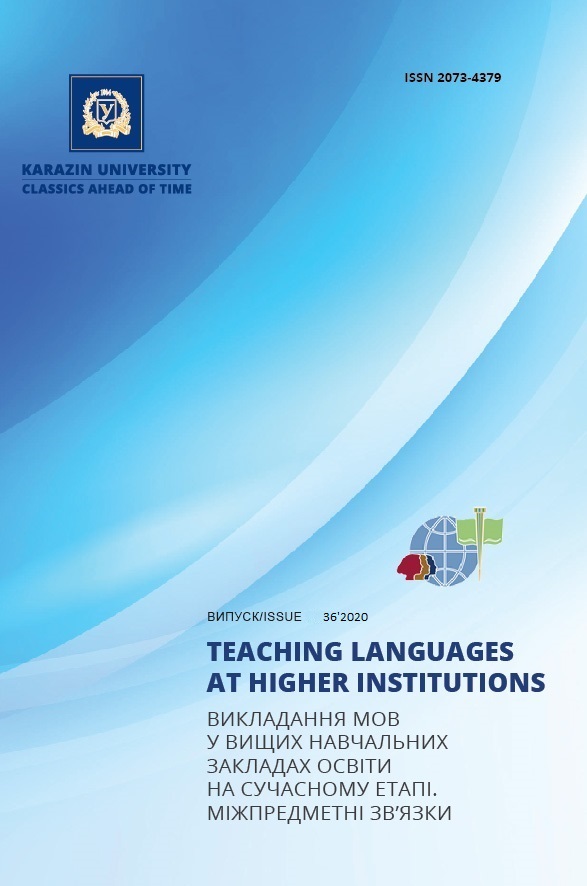A communicative act as a main unit of teaching Ukrainian as a foreign language
Abstract
The author, emphasizing the necessity of updating the content of the language education of non-philological foreign students of Ukrainian universities, performs a linguo-didactic analysis of the subject side of the content of the system of teaching Ukrainian as a foreign language to non-philological students. Within the modern linguistic paradigm, the subject content of teaching a foreign language, in particular UFL, is considered a system of linguistic means (phonetic, lexical, grammatical, stylistic, socio-cultural, speech etiquette, rhetorical). In the conditions when the modern linguodidactic paradigm is dominated by communicative-activity and intercultural approaches and the consciously-practical method of teaching, aimed at ensuring that foreign students would master the content component of their language education, the following units of learning are recognized: sentences, expressions, texts, and dialogues. The need for updating the content component of the teaching system of UFL arises in connection with the requirements of the modern information society and new requirements for the tasks and results of teaching foreign languages. It has been found that the achievements of a relatively new theory of language communication will allow refining the components of the content of foreign language teaching, which will have an impact on improving the quality of language education of foreign non-philological students of Ukrainian universities. The submitted scientific research substantiates the choice of such a unit of study as a communicative act, which in the future allows reforming the educational process to attract foreign students to Ukrainian discourses. The author describes the structural-semantic components of the personal, verbal-cognitive, verbal and extraverbal levels of the communicative act as a fragment of the communication process within a certain communicative situation. The conclusion is made about the potentialities of the described parameters of the communicative act as a basis for updating the steady methodical principles of language material selection.
Downloads
References
Bacevych, F.S. (2004). Osnovy komunikatyvnoyi lingvistyky [Fundamentals of Communicative Linguistics]. Kyiv: Akademiya [in Ukrainian].
Bahtin, M. (2001). Vyslovlyuvannya yak odynycya movlennyevogo spilkuvannya [Speech as a unit of speech communication]. Antologiya svitovoyi lit.-krytychnoyi dumky XX st. [Anthology of world literary-critical thought of the twentieth century]. Lviv: Litopys, pp. 406–415 [in Ukrainian].
Bigych, O.B., Borysko, N.F., Boreczka, G.E. et al. (2013). Metodyka navchannya inozemnyh mov i kultur: teoriya i praktyka [Methods of teaching foreign languages and cultures: theory and practice]. Nikolayeva, S.Yu. (Ed.). Kyiv: Lenvit [in Ukrainian].
Dridze, T.M. (1976). Interpretacionnye harakteristiki i klassifikacija tekstov [Interpretation characteristics and classification of texts]. Smyslovoe vosprijatie rechevogo soobshhenija [The semantic perception of a speech message]. Moscow: Editorial URSS, pp. 34–45 [in Russian].
Hymes, D. (1992). The concept of communicative competence revisited. Thirty Years of Linguistic Evolution. John Benjamins Publishing, pp. 31–58 [in English].
Issers, O.S. (2008). Kommunikativnye strategii i taktiki russkoj rechi [Communicative strategies and tactics of Russian speech]. Moscow: Izdatelstvo LKI [in Russian].
Karasik, V.I. (2000). Struktura institucionalnogo diskursa [Institutional discourse structure]. Problemy rechevoj kommunikacii [Speech communication problems]. Saratov: Izd-vo Sarat. un-ta, pp. 25–33 [in Russian].
Kljuev, E.V. (2002). Rechevaja kommunikacija [Speech communication]. Moscow: Ripol klassik [in Russian].
Kosmina, V.Yu. (2019). Formuvannya konceptiv u navchanni studentiv iz klipovym myslennyam [Formation of concepts in teaching students with video thinking]. Vykladannia mov u vyshchykh navchalnykh zakladakh osvity na suchasnomu etapi. Mizhpredmetni zviazky [Teaching Languages at Higher Institutions]. Kharkiv: V.N. Karazin Kharkiv National University, 35, pp. 70–79 [in Ukrainian]. DOI: https://doi.org/ 10.26565/2073-4379-2019-35-06.
Krasnyh, V.V. (2001). Osnovy psiholingvistiki i teorii kommunikacii [Fundamentals of psycholinguistics and communication theory]. Moscow: ITDGK Gnozis [in Russian].
Kuranova, S.I. (2012). Osnovy psyholingvistyky [Fundamentals of psycholinguistic]. Kyiv: VCz “Akademiya” [in Russian].
Kushnir, I. (2017). Frame teaching methods in training Ukrainian as a foreign language. Nadmoshhie i prisposobjavane [Supremacy and adaptation]. Sofia (Bulgaria), II, pp. 347–355 [in English].
Kushnir, I.M. (2018). Filosofski zasady suchasnoyi kompetentnisnoyi lingvodydaktychnoyi paradygmy [The philosophical foundations of the modern competence linguo-didactic paradigm]. Vykladannia mov u vyshchykh navchalnykh zakladakh osvity na suchasnomu etapi. Mizhpredmetni zviazky [Teaching Languages at Higher Institutions]. Kharkiv: V.N. Karazin Kharkiv National University, 33, pp. 76–88 [in Ukrainian]. DOI: https://doi.org/10.26565/2073-4379-2018-33-07.
Makarov, M.L. (2003). Osnovy teorii diskursa [Fundamentals of Discourse Theory]. Moscow: Gnozis [in Russian].
Metodyka navchannya inozemnyh mov u serednih navchalnyh zakladah [Methods of teaching foreign languages in secondary schools]. (1999). Kyiv: Lenvit [in Ukrainian].
Misinkevych, O. (2014). Koncept kultury yak odynycya mentalnoyi informaciyi u movnij kartyni svitu [The concept of culture as a unit of mental information in the linguistic picture of the world]. Movoznavstvo [Linguistic]. Kyiv, 1, pp. 54–57 [in Ukrainian].
Semenyuk, O.A. and Parashhuk, V.Yu. (2010). Osnovy teoriyi movnoyi komunikaciyi [Fundamentals of the theory of language communication]. Kyiv [in Ukrainian].
Shukin, A.N. (2012). Obuchenie rechevomu obshheniju na russkom jazyke kak inostrannom [Teaching of speech communicate in Russian as a foreign language]. Moscow: Rus. jaz. Kursy [in Russian].
Standartyzovani vymogy: rivni volodinnya ukrayinskoyu movoyu yak inozemnoyu A1–C2. Zrazky sertyfikacijnyh zavdan [Standardized requirements: proficiency in Ukrainian as a foreign A1–C2. Examples of certification tasks]. (2020). Kyiv: Firma “INKOS” [in Ukrainian].
Stepanov, Ju.S. (1995). Alternativnyj mir. Diskurs. Fakt i princip prichinnosti [Alternative world. Discourse. Fact and principle of causality]. Jazyk i nauka konca ХХ veka [Language and science of the late twentieth century]. Moscow: Progress, pp. 35–73 [in Russian].

